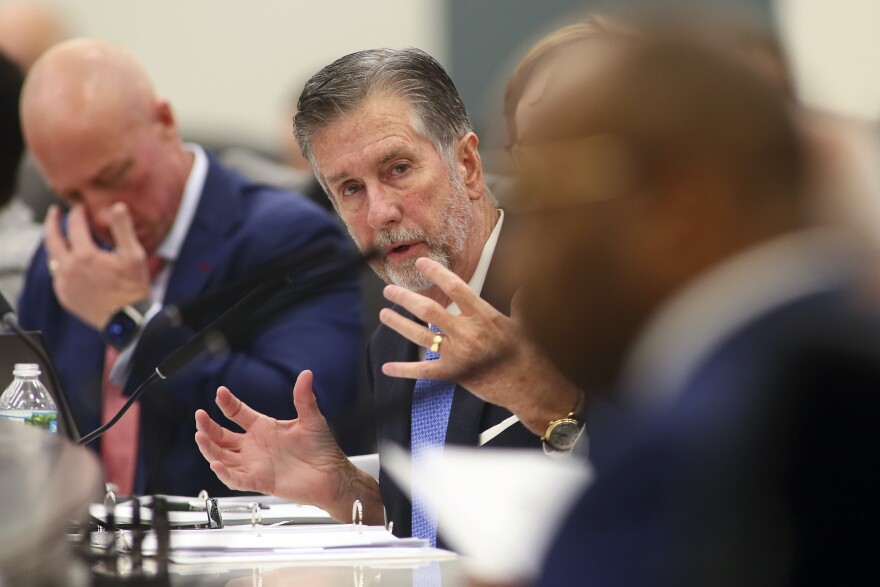Florida lawmakers on both sides of the aisle agree that any changes they make to the state's property insurance laws this week should reduce rates, but they're divided on how to get there.
“There’s nothing that I’ve seen that actually will bring rates down for homeowners," said House Minority Leader Rep. Fentrice Driskell (D-Tampa). "And that’s the number one complaint that we get from our constituents is that the rates are just too high."
The average cost of property insurance in the state is about three times higher than the national average. On average, rates have gone up by about 33% each year.
Lawmakers are voting this week on two nearly identical Republican-sponsored property insurance bills filed in the House and Senate. Each one contains several provisions aimed at reducing insurance fraud, litigation and reinsurance costs and curbing the growth of Citizens Property Insurance Corporation, the state-run insurer of last resort.
The bill passed the Senate on Tuesday with a 27-13 vote, mostly along party lines. The House will take up its version on Wednesday after the measure passes its final committee stop.
Driskell filed a Democrat-backed measure to fix the state's property insurance market, but it wasn't taken up for a vote. Democrats also proposed a slew of amendments aimed at strengthening consumer protections, but they all failed.
After the November elections, Republicans gained a supermajority in both the House and Senate, giving them the ability to pass any policies they want.
Republicans say legislation would reduce litigation against insurers
Insurance industry leaders have cited "excessive litigation" in the state as the reason why rates are rising and property insurance companies are closing, said Mark Friedlander, the Florida spokesman for the Insurance Information Institute, a research organization that tracks industry trends.
"This has been the key driver of why so many Florida residential insurers are failing," Friedlander said. "In fact, six companies have gone insolvent this year because of litigation expenses."
In an effort to disincentivize lawsuits brought against insurers, the bill would put an end to one-way attorney's fees, which property insurance companies are required to pay whenever they lose to a policyholder in court.
"This is groundbreaking legislation," Friedlander said. "In fact, it is the strongest insurance reform package we have ever seen proposed in Florida."
Republican lawmakers say Florida would become the 40th state in the nation to not allow one-way attorney's fees if the measure becomes law.
"If one cent or more is awarded to the policyholder in a lawsuit, the insurance company has been liable for all attorney fees that are generated as part of that lawsuit," Friedlander said, explaining the new legislation would stop that problem. "It appears the new leadership of the Florida House and Florida Senate understand what is the driver of our state's property insurance crisis."
Critics argue the measure would hurt consumers
Several trial attorneys have spoken out against the measure, arguing that it would block consumers' access to the courts.
In addition to ending one-way attorney's fees, the legislation would create conditions allowing insurance companies to persuade policyholders to sign a "mandatory binding arbitration" agreement.
That would effectively prevent that policyholder from taking the insurer to court if the company acts in bad faith, explained David Murray, a Tampa-based trial attorney who specializes in litigation against property insurers.
"I don't have one client of mine that wants to be a client," Murray said. "They're a client because insurance companies don't live up to their obligations, and this bill gives them further incentive to do that."
Murray says removing one-way attorney's fees is also the wrong approach. “When you remove any ability for the insured to be reimbursed professional fees and attorney’s fees and costs if the insurance company is wrong, you take away insureds' rights to challenge what the insurance company determines through the claim process.”
Nothing in the bill requires insurance companies to lower rates by a specified amount. The legislation would require insurers to offer a reduction in rates in exchange for the signing of a mandatory binding arbitration agreement, but it doesn't specify an amount by which rates would go down.
Still, Republicans and the bill's proponents have said the proposed changes will stabilize the market, thereby driving down rates.
“Our number one priority and what I’ve been saying for days is: 'What can we do to protect our consumers?'" said Senate President Kathleen Passidomo (R-Naples). "The bill is chock full of provisions to protect our consumers.”
Murray says in his opinion, not everything in the bill is bad for consumers. For instance, the legislation would eliminate assignment of benefits, meaning roofers, plumbers and other home repair contractors would no longer have the ability to take over policies and receive payment for the work directly from the insurer, Murray explained.
"There needs to be assignment of benefit reform," he said. "I think that is a good part of this legislation."
Murray says reducing the amount of time that property insurers have to respond to claims and pay policyholders is also good for consumers.
"There are some good intentions in this legislation, but stripping away consumer protections is the wrong way to go about it, especially if you're not going to give real rate reform."


